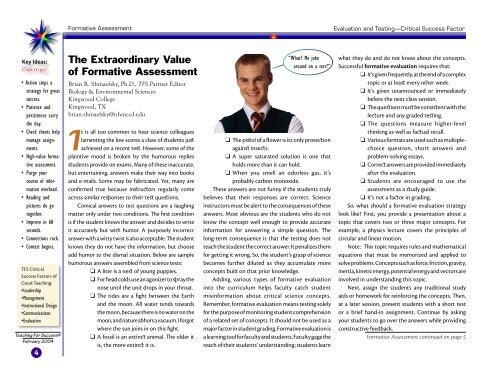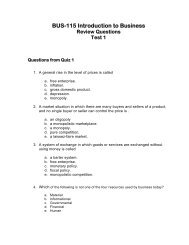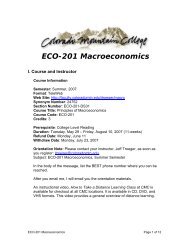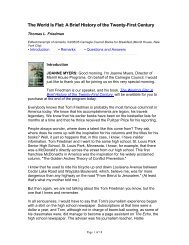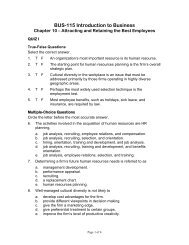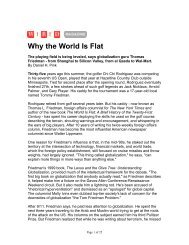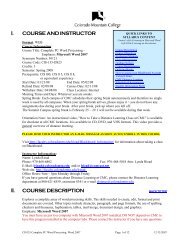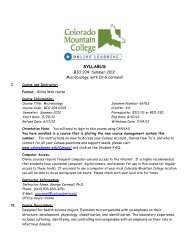Formative AssessmentEvaluation and Testing—Critical Success FactorKey Ideas:Click to go!• Action steps astrategy for greatsuccess.• Patience andpersistence carrythe day.• Check sheets helpmanage assignments.• High-value formativeassessment.• Purge yourcourse of informationoverload.• Reading andpictures do gotogether.• Improve in 60seconds.• Connections rock.• Contest begins.TFS CriticalSuccess Factors ofGood Teaching:•Leadership•Management•Instructional Design•Communications•EvaluationTeaching For Success®<strong>February</strong> <strong>2004</strong>4The Extraordinary Valueof Formative AssessmentBrian R. Shmaefsky, Ph.D., TFS Partner EditorBiology & Environmental SciencesKingwood CollegeKingwood, TXbrian.shmaefsky@nhmccd.eduIt is all too common to hear science colleagueslamenting the low scores a class of students justachieved on a recent test. However, some of theplaintive mood is broken by the humorous repliesstudents provide on exams. Many of these inaccurate,but entertaining, answers make their way into booksand e-mails. Some may be fabricated. Yet, many areconfirmed true because instructors regularly comeacross similar responses to their test questions.Comical answers to test questions are a laughingmatter only under two conditions. The first conditionis if the student knows the answer and decides to writeit accurately but with humor. A purposely incorrectanswer with a witty twist is also acceptable. The studentknows they do not have the information, but chooseadd humor to the dismal situation. Below are samplehumorous answers assembled from science tests:❑ A liter is a nest of young puppies.❑ For head colds use an agonizer to spray thenose until the unit drops in your throat.❑ The tides are a fight between the Earthand the moon. All water tends towardsthe moon, because there is no water on themoon, and nature abhors a vacuum. I forgotwhere the sun joins in on this fight.❑ A fossil is an extinct animal. The older itis, the more extinct it is.“What? Me jokearound on a test?”❑ The pistol of a flower is its only protectionagainst insects.❑ A super saturated solution is one thatholds more than it can hold.❑ When you smell an odorless gas, it’sprobably carbon monoxide.These answers are not funny if the students trulybelieves that their responses are correct. Scienceinstructors must be alert to the consequences of theseanswers. Most obvious are the students who do notknow the concept well enough to provide accurateinformation for answering a simple question. Thelong-term consequence is that the testing does notteach the student the correct answer. It penalizes themfor getting it wrong. So, the student’s grasp of sciencebecomes further diluted as they accumulate moreconcepts built on that prior knowledge.Adding various types of formative evaluationinto the curriculum helps faculty catch studentmisinformation about critical science concepts.Remember, formative evaluation means testing solelyfor the purpose of monitoring student comprehensionof a related set of concepts. It should not be used as amajor factor in student grading. Formative evaluation isa learning tool for faculty and students. Faculty gage thereach of their students’ understanding; students learnwhat they do and do not know about the concepts.Successful formative evaluation requires that:❑ It’s given frequently, at the end of a complextopic or at least every other week.❑ It’s given unannounced or immediatelybefore the next class session.❑ The questions must be consistent with thelecture and any graded testing.❑ The questions measure higher-levelthinking as well as factual recall.❑ Various formats are used such as multiplechoicequestion, short answers andproblem-solving essays.❑ Correct answers are provided immediatelyafter the evaluation.❑ Students are encouraged to use theassessment as a study guide.❑ It’s not a factor in grading.So, what should a formative evaluation strategylook like? First, you provide a presentation about atopic that covers two or three major concepts. Forexample, a physics lecture covers the principles ofcircular and linear motion.Note: This topic requires rules and mathematicalequations that must be memorized and applied tosolve problems. Concepts such as force, friction, gravity,inertia, kinetic energy, potential energy and vectors areinvolved in understanding this topic.Next, assign the students any traditional studyaids or homework for reinforcing the concepts. Then,at a later session, present students with a short testor a brief hand-in assignment. Continue by askingyour students to go over the answers while providingconstructive feedback.Formative Assessment continued on page 5
Keeping Students InformedCommunications—Critical Success FactorKey Ideas:Click to go!• Action steps astrategy for greatsuccess.• Patience andpersistence carrythe day.• Check sheets helpmanage assignments.• High-value formativeassessment.• Purge yourcourse of informationoverload.• Reading andpictures do gotogether.• Improve in 60seconds.• Connections rock.• Contest begins.TFS CriticalSuccess Factors ofGood Teaching:•Leadership•Management•Instructional Design•Communications•EvaluationTeaching For Success®<strong>February</strong> <strong>2004</strong>5Information Overload—How to Cage the TigerCara E. Taylor, TFS Partner AuthorBaker College of MuskegonMuskegon, MIcarataylor@aol.comToo often, students are overwhelmed with a surplusof course information; this causes misseddeadlines and misunderstood requirements.To some students, it may seem impossible to keepit all organized. Keeping the lines of communicationopen between the instructor and student is essential;moments of frustration or ambiguity often arise whenissues aren’t discussed with clarity and creativity. It maytake some innovation on the part of the instructor tocope with the effects of information overload.Ideally, students should be aware of the long-termrequirements for the course, which are listed in the classsyllabus. However, frequent reminders of assignmentsdue, chapters to be read, discussion topics, etc. mustbe issued to keep students on track. Here are severalways that I use to cage this paper tiger.Daily agendaFirst, at the outset of each class session, post theday’s agenda on the board. To eliminate any confusion,title the agenda with the date. Alternating with vibrantcolors, list all activities that will be accomplished duringthe class session. Think of captivating titles that willspark interest and curiosity among the students abouteach planned activity. For example, reviewing Chapter 7for a geography class could be better listed as “ChattingAbout China.” Highlight the break time, and note whenstudents are to return to class. End the daily agendawith a positive comment, such as “Head for Home” or“See You Next Wednesday.” Students will appreciateknowing what to expect for the next class session.Course newsletterAnother organizational technique is to create acourse newsletter [paper or electronic]. Headline thenewsletter with a catchy title, such as “The CalculusConnection” or “History 101 Highlights.” To energizethe document, include an inspirational quote at thetop. Next, in a table format, list assignments andreadings that are due for that week and the followingweek. The remainder of the newsletter can be usedto highlight important information that may includespecific assignment requirements, changes in thesyllabus, answers to student questions, or clarificationof course issues.Student mailboxesTo reduce the time consuming task of deliveringhandouts and returning assignments, provide studentswith their own mailboxes. This can easily be donewith a plastic crate and file folders. Label each filefolder with the student’s name and place it in thecrate alphabetically. Before each class, fill the student’smailboxes with handouts they will be using for thatsession. Include chapter outlines, activities to be donethat day, or graded assignments. Place the crate in alocation near the door, so students can get their mailwhen they enter class.Refining course communications and addingchannels means more valuable class time will beavailable for learning tasks. This is a double win.TFS Action StepIdentify your classes communication’s bottlenecks.Select or create your own method to improve studentcommunications. Test it this week.Formative Assessment continued from page 4Next, request that the students hand in theassessment so you can evaluate the level ofunderstanding. Review the concepts if many of yourstudents do not grasp them. Suggest tutoring forstudents who have not satisfactorily learned thematerial. Lastly, return the assessments so that studentscan use them as a studying tool.The formative assessment strategy outlined in thisexample uses traditional testing methods. However,you can use other approaches to evaluating studentcomprehension. For example, “game show” typeverbal quizzes and problem-solving group activitiescan be used alone or in conjunction with traditionalassessment methods. Formative assessment isa proven instructional supplement supportedby years of educational research. Unfortunately,college instruction too often makes little use of thisextraordinary pedagogical aid.ReferencesGeis, George L.; Formative Evaluation: DevelopmentalTesting and Expert Review. Performance and Instruction26, no. 4 (1992): 1-8.Kushner, S. Personalizing Evaluation London: Sage.2000.Pawson, R. & Tilley, N. Realistic Evaluation London:Sage. 1997.Scriven, M. “The methodology of evaluation”. Worthen,B. R. & Sanders, J. R. (eds) Educational Evaluation:theory and practice Belmont, Cal. Wadsworth.1973.TFS Action StepAdd a traditional or alternative formativeassessment plan to your course, and then evaluatethe results.


